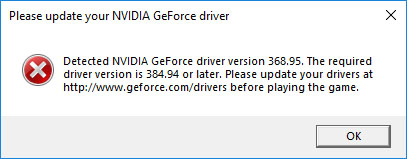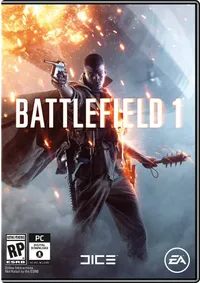AMD vs Nvidia: Whose Driver Updates Improve Performance More?
Battlefield 1 (2016, DX12)
Battlefield 1’s October 2016 introduction takes us to the point where we’re testing games that weren’t around when GeForce GTX 1060 6GB and Radeon RX 480 launched. The game reminds us of this by detecting Nvidia’s 368.95 driver and asking for an update to 384.94 or newer. Strangely, AMD’s similarly-old 16.6.2 build didn’t trigger the same error.
Regardless, this third Battlefield entry in today’s experiment is still based on the mature Frostbite game engine, so it’s no surprise to see both GPU vendors serving up smooth performance across two years of driver updates.
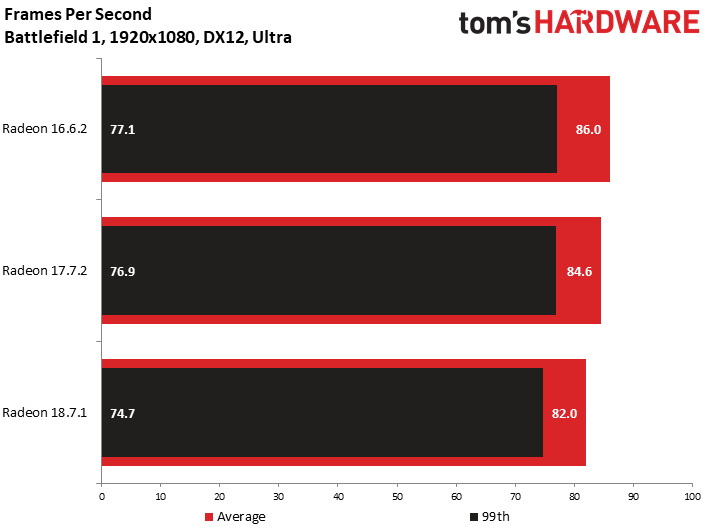
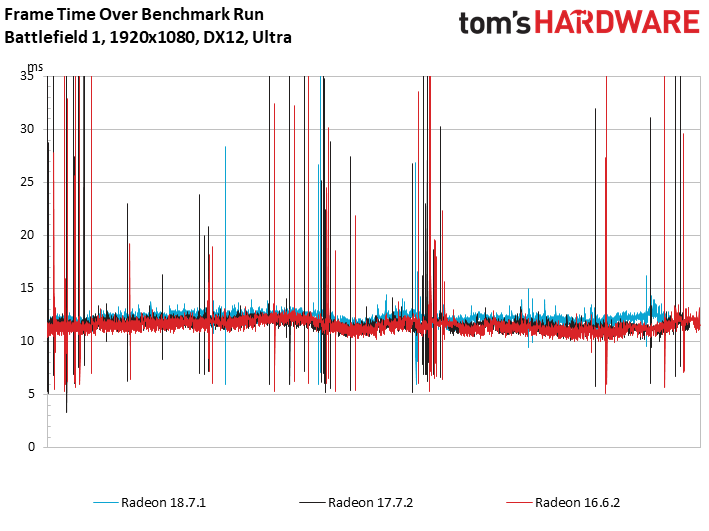
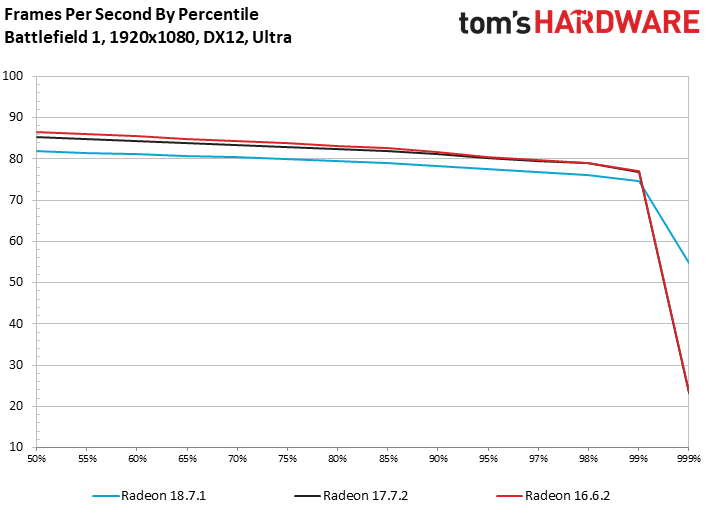
Although it’s disappointing to see the Radeon RX 480’s average frame rate decline year after year, there’s a positive story hiding deep within the data.
First, tab over to frame time chart. The two oldest driver versions—16.6.2 and 17.7.2—demonstrate big frame time spikes at similar points through our test sequence. AMD cards are especially notorious for stuttering when we start recording performance. This behavior largely ceases in 18.7.1. In fact, a lot of the frame time spikes shared between prior drivers disappear entirely with the latest one. The outcome is clear in our FPS by percentile breakdown: Adrenalin Edition 18.7.1 yields a smoother experience in the slowest 1% of frames, despite registering a lower average frame rate.
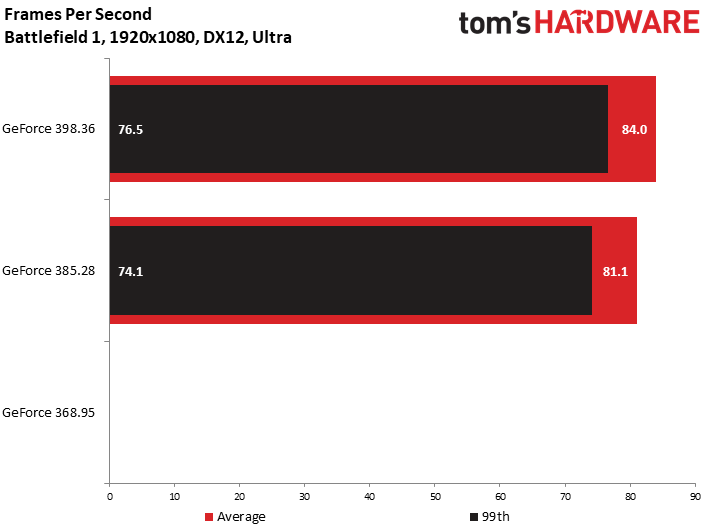
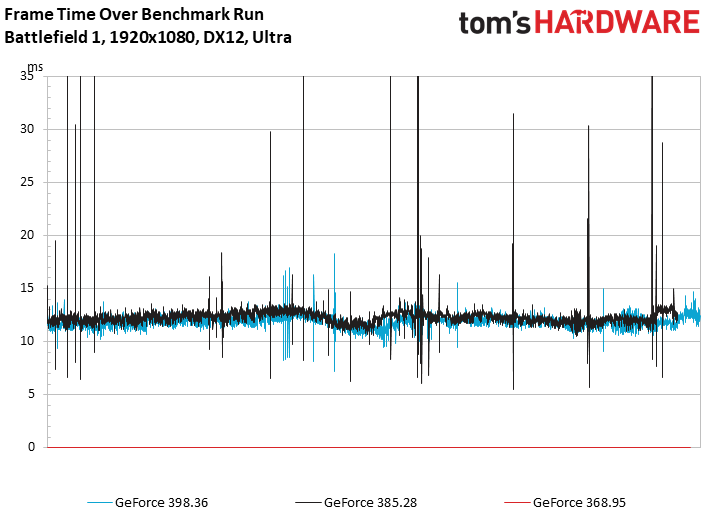
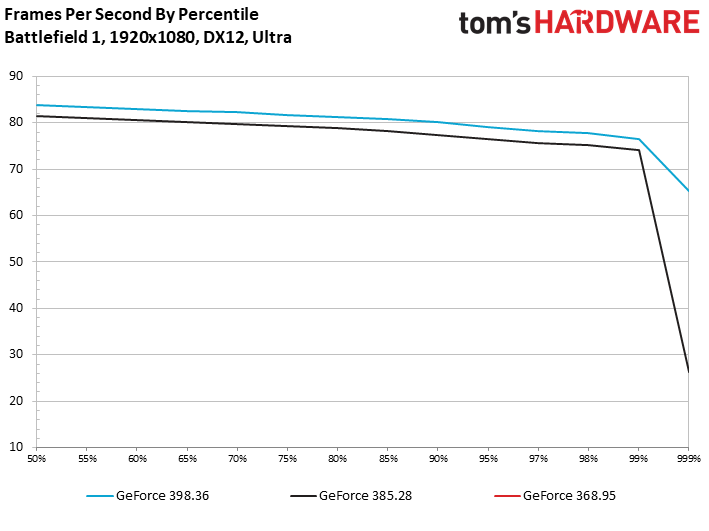
Again, Battlefield 1 wouldn’t start with 368.95 installed, so we only have two data points to share. Performance definitely improves from 385.28 to 398.36, though. As with the Radeon, a lot of frame time spikes that plagued GeForce GTX 1060 6GB one year ago disappear using Nvidia’s newest driver. Consequently, the slowest 1% of frames in our test sequence are much smoother than they were previously.
MORE: Best Graphics Cards
MORE: Desktop GPU Performance Hierarchy Table
Get Tom's Hardware's best news and in-depth reviews, straight to your inbox.
MORE: All Graphics Content
Current page: Battlefield 1 (2016, DX12)
Prev Page Tom Clancy’s The Division (2016, DX12) Next Page Ashes of the Singularity: Escalation (2016, DX12)-
Tmanishere If you compare the cost of Freesync monitor vs G-sync monitor, AMD usually edges over Nvidia in terms of performance vs cost.Reply -
bloodroses A comparison of cards a couple generations old would be a good article as well since these cards are still considered current. It's a pretty common myth that AMD has better support long term whereas Nvidia either drops decent (or even cripples) support on any hardware that isn't current gen. It would be interesting to see the validity in it.Reply -
jimmysmitty Reply21214234 said:i still go for AMD to keep a competitor alive
Only if the price is right. I can't even understand anyone who bought an AMD card when the crypto-currencies were inflating the price to insane levels.
21214277 said:If you compare the cost of Freesync monitor vs G-sync monitor, AMD usually edges over Nvidia in terms of performance vs cost.
True but then the monitor isn't part of the GPU nor is affected by drivers. If thats an important metric for someone then yes it helps. However it doesn't help AMD perform better.
21214328 said:A comparison of cards a couple generations old would be a good article as well since these cards are still considered current. It's a pretty common myth that AMD has better support long term whereas Nvidia either drops decent (or even cripples) support on any hardware that isn't current gen. It would be interesting to see the validity in it.
I don't think there is any validity to it. Its probably came about when new GPUs get released newer drivers sometimes rarely have updates for older hardware. This isn't exclusive to nVidia. I ran ATI then AMD GPUs for 10 years and plenty of times new drivers would come out and performance gains would only apply to new GPUs and not my 1 or 2 gen old GPU.
I do think nVidia has more driver releases than AMD. However driver updates and performance gains all depend. It depends on which games each company focuses on. That might be why some gains are better for each in some games. -
Peter Martin oh yeah, I only buy on good deals.. lol, I don't understand anyone always having to have the latest either. I can wait a few yrs to play video games affordably.Reply -
Johnny Baker I will always favor AMD over Nividia any day. I am not impressed at all by what people claim to be facts. All I can tell you: I'm and AMD freak, always will be, and proud of it.Reply -
derekullo This article reminded me of a quote in another article from a decade ago.Reply
"AMD and Nvidia release numerous driver builds every year. If each of these drivers were to increase 3D speed by 10 percent, the graphics cards would double their performance in a few months. "
https://www.tomshardware.com/reviews/GeForce-Catalyst-overclocking,2037.html
They backtrack a little bit, but I still laugh when I see Nvidia/AMD report an increase of 10% on every little driver update.
For a trip down memory lane and a display of how the chart making skills at Tom's has improved let me reintroduce;
https://www.tomshardware.com/reviews/GeForce-Catalyst-overclocking,2037-14.html -
Matt_550 Should've opted just for the 580X vs 1060 comp since the 480X had to be nurfed because of the failure of its power delivery system that was upgraded for the 580X.Reply -
jimmysmitty Reply21214551 said:This article reminded me of a quote in another article from a decade ago.
"AMD and Nvidia release numerous driver builds every year. If each of these drivers were to increase 3D speed by 10 percent, the graphics cards would double their performance in a few months. "
https://www.tomshardware.com/reviews/GeForce-Catalyst-overclocking,2037.html
They backtrack a little bit, but I still laugh when I see Nvidia/AMD report an increase of 10% on every little driver update.
For a trip down memory lane and a display of how the chart making skills at Tom's has improved let me reintroduce;
https://www.tomshardware.com/reviews/GeForce-Catalyst-overclocking,2037-14.html
Those 10% though ar enot for the same game every time. If you read driver notes they typically state what performance gains you might see on what game and what hardware.
There is very rarely a just generic across the board performance improvement for all games. Now if the companies could focus on say just the API and improve the performance on DX12 then that could apply to DX12 titles but it still does not work that way unfortunately.
